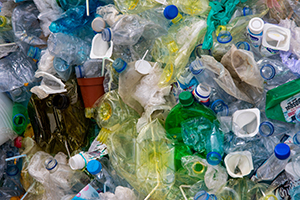National Guidance
The Government’s Department for Environment Food & Rural Affairs (DEFRA) has prepared guidance on prioritising waste collection services during the coronavirus pandemic. This guidance has been developed through direct engagement with local authorities and the waste industry.
 Waste and recycling crews have been designated by the Government as essential front-line workers during the pandemic. With more people now staying at home, it is inevitable that more household waste is being created, putting pressure on recycling and waste services.
Waste and recycling crews have been designated by the Government as essential front-line workers during the pandemic. With more people now staying at home, it is inevitable that more household waste is being created, putting pressure on recycling and waste services.
Prioritising waste collections
Different types of waste collection have been ranked in priority order with food waste marked as high priority. Where food waste is routinely collected, for instance weekly, this service should be maintained so that rotting food does not build up. Decaying food left to putrefy can create a bio-aerosol risk, which data suggests may contribute to respiratory illnesses.
Handling waste safely
Specialist clearance and cleaning companies can carry out a waste audit to help businesses understand their commercial food waste needs. They can advise how to safely dispose of food according to your waste volumes and specific requirements.
In light of COVID-19, many local authorities and private waste collection companies are offering disinfection treatments of potentially contaminated surfaces, including waste and recycling bins, to reduce the risk of infection transmission and to reassure employees and customers that they can return to work safely. This is particularly important for food retailers handling increased quantities of food waste and recycling.
Waste Regulations
New regulations set out in the Environment Bill, which is currently moving through Parliament, aim to divert as much waste from landfill as possible and reduce carbon emissions. The Bill lists all the materials that must be collected from households and premises, including food waste. In the future, organisations that produce waste will have a responsibility to separate recyclable materials and to arrange for their collection. These requirements are expected to come into force from 2023, subject to consultation. Specialist waste collection companies are already taking steps to meet these measures, providing colour coded containers so that businesses can easily separate different types of waste, as well as more eco-conscious, biodegradable waste bag options.
Responsible recycling
There are a number of specialist waste processing facilities that can help businesses divert their waste away from landfill. Food waste can be responsibly recycled at an anaerobic digestion facility, for example. This process effectively turns commercial food waste into renewable energy, helping businesses to manage and even reduce their waste costs.
Waste crime
Waste crime can have a devastating impact on the environment and people’s quality of life. The Environment Bill includes measures to tackle waste crime, such as improving waste management and making better use of waste as a valuable resource.
Measures set out in the Bill will ensure that agencies and authorities have improved enforcement powers to tackle littering and related offences.
Managing waste more effectively
Here are some useful tips to manage your waste collections.
• If your waste bins are not full by collection day consider a less frequent collection or fewer bins. This may also save you money as most collections charge for the number of bins they collect.
• Look at what materials you are throwing away most of – if you already have a recycling collection for these items make sure employees are fully aware of what can and can’t go into the recycling bin. If you’re not already recycling them check with your waste service provider to find out what items can be recycled in your area, as waste collections do vary from place to place.
• Check that the items you use are packaged in recyclable materials; otherwise you will be charged to dispose of them.
• Flatten bulky items before you bin them, to make the most of the space in your bin, and help to reduce the number of bins for collection.
